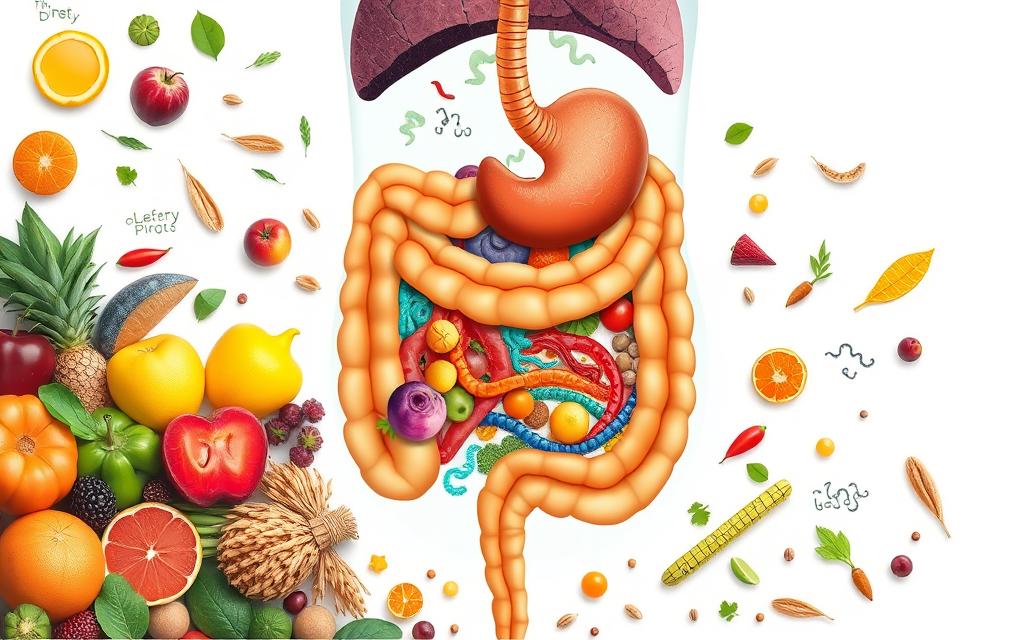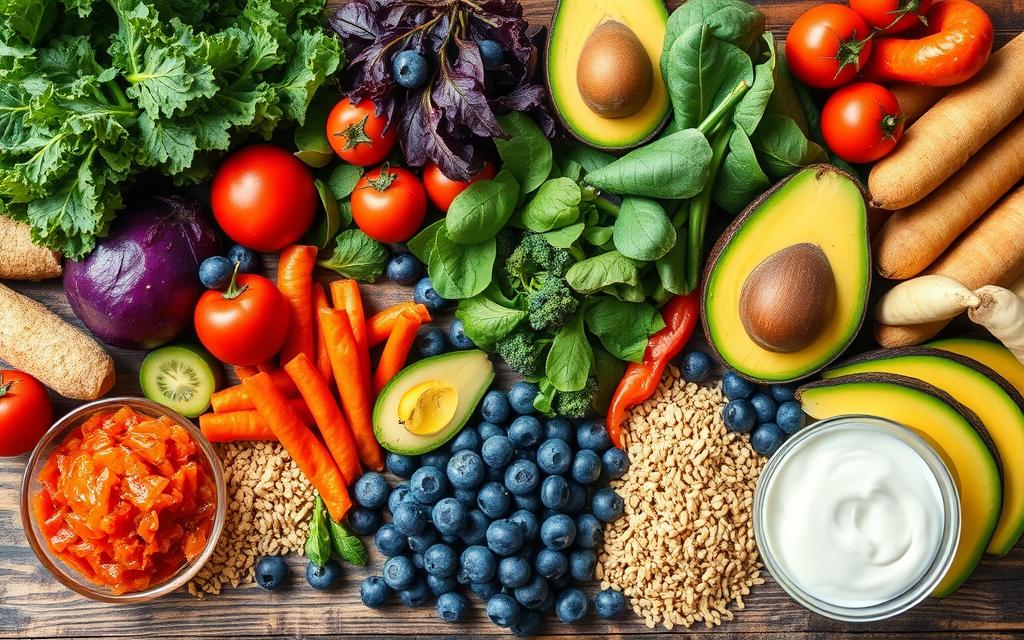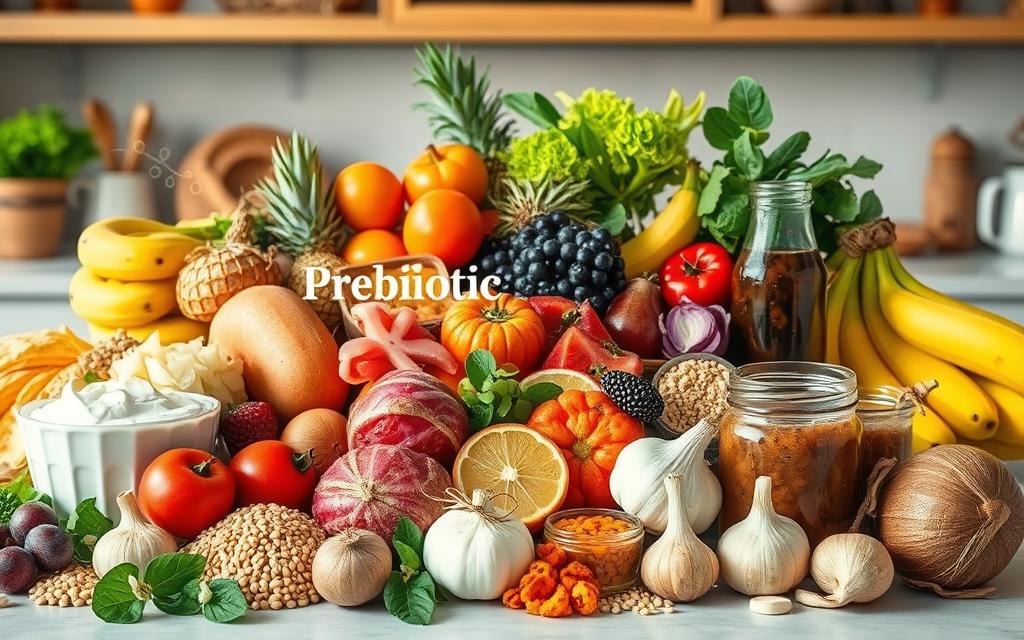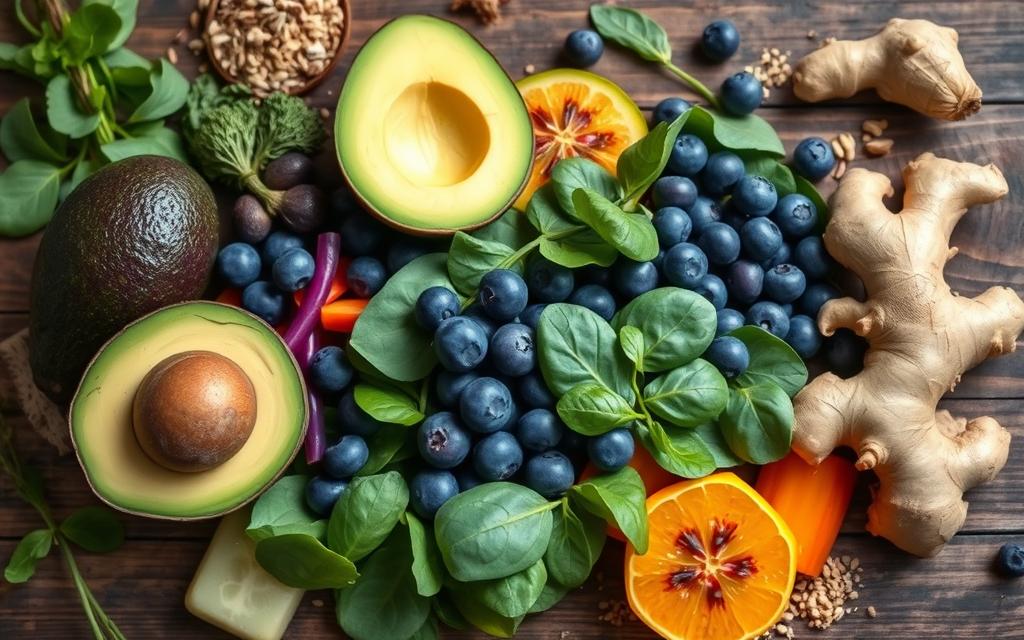Modern life can make us forget about our gut health and diet connection. Have you ever thought about how food affects our health and mood? Our diet shapes the gut microbiome, which is key for our immune system and mood. Research shows diet greatly impacts our gut health1.
Making healthy food choices is more than just looking good. It’s about keeping our gut healthy and balanced with our overall well-being.
In this article, we explore the strong bond between gut health and diet. We’ll see how choosing our food wisely can boost our gut microbiome and improve our lives.
Key Takeaways
- A thriving gut microbiome is crucial for overall health and well-being.
- Our dietary choices significantly shape the diversity and function of gut microorganisms.
- Dietary patterns like the Mediterranean diet offer protective benefits against various diseases.
- High-fiber foods enhance gut health by fostering a diverse microbial community.
- Understanding the connection between our food and gut health can empower better lifestyle choices.
Introduction to Gut Health
Understanding gut health is key to our overall well-being. It involves the health of our intestinal barrier and a balanced mix of bacteria. This balance is crucial for our body’s health.
A healthy gut has trillions of bacteria that protect us from harmful invaders. When our gut microbiome is balanced, different bacteria work together. This boosts our health and helps us fight off diseases2.
Dysbiosis, or an imbalance of bacteria, can cause many health issues. These include stomach problems and inflammation2. Signs of gut health problems include bloating, gas, and stomach pain. These can turn into serious chronic conditions3.
Our lifestyle, stress, and diet greatly affect our gut health. Most Americans don’t get enough fiber, which is important for digestive health3.
Choosing a gut-friendly diet can greatly improve our health. Eating right helps prevent dysbiosis, which is linked to diseases like Inflammatory Bowel Disease (IBD)2. Our diet is crucial for keeping our digestive system healthy.
Understanding the Gut Microbiome
The gut microbiome is a huge community of tiny life forms that are key to our digestive health. Inside our intestines, there are about 3.8 × 10^13 microbes. This number is much higher than the number of our host cells, which is around 3.0 × 10^134. These tiny beings help break down our food and absorb nutrients, showing how what we eat affects our gut.
What is the Gut Microbiome?
Every person has at least 160 types of microorganisms from a total of 1150 that can live in our gut. The most common ones are Firmicutes and Bacteroidetes, making up about 90% of our gut microbiota4. A healthy gut microbiome is important for our overall health. But, an imbalance, or dysbiosis, can lead to problems like obesity, diabetes, and inflammatory bowel disease (IBD)4.
The Role of Microorganisms in Digestion
Microorganisms in our gut are crucial for digesting food, like dietary fibers. They also make short-chain fatty acids (SCFAs), which are good for us. Eating foods high in fiber, like raw garlic or legumes, helps our gut microbiota make SCFAs. These SCFAs can make our intestinal lining stronger5.
A diet low in fiber can harm our beneficial microbes and increase harmful ones. This shows how important it is to eat foods that support our gut health to keep our digestion balanced5.
The Importance of a Healthy Gut
A healthy gut is key for our overall health. It’s the base of our immune system, metabolism, and mental health. The gut is about 20 to 24 feet long, home to trillions of microbes. These microbes help digest food and affect our mood and thinking through the gut-brain axis67.
Connection to Overall Health
Good gut health is essential for our health. About 90% of serotonin, which helps us feel good, is made in the gut7. A diverse gut microbiome helps us digest food better and absorb nutrients. It also protects us from health problems like allergies and depression7.
Poor gut health can cause heartburn, stomach pain, constipation, or diarrhea6. Research shows that an imbalanced gut microbiome is linked to obesity and inflammatory bowel disease (IBD)8.
Impact on Immunity and Metabolism
Keeping our gut healthy is vital for our immune system and metabolism. Eating foods high in fiber, like veggies, beans, nuts, and whole grains, is important for gut health7. Bad gut health can lead to more inflammation, weakening our immune system7.
Getting enough sleep, staying hydrated, and eating fermented foods can greatly improve our gut health6. Our diet can quickly affect our gut, causing gas or bloating within 24-48 hours6.

The Impact of Diet on Gut Microbiota Composition
Our diet greatly affects the balance of gut bacteria. It influences the variety and function of microbes in our gut. Knowing how different nutrients impact this balance is key to good gut health.
How Macronutrients Shape Our Microbiome
Macronutrients like proteins, fats, and carbs have unique effects on our gut bacteria. For example, people eating more protein and animal fats tend to have more Bacteroides and Firmicutes. On the other hand, vegetarians often have more Prevotella.
The way we eat has changed a lot over the years. This has made our gut bacteria less diverse9. Hunter-gatherers, who mostly eat plants, have healthier gut bacteria9.
Dietary Fiber and Its Role
Dietary fiber is very important for a healthy gut. It helps grow good bacteria like Bifidobacterium and Lactobacillus10. It also makes short-chain fatty acids, which are energy for our gut cells and keep them healthy11.
Eating fiber can also lower the risk of colon cancer. It helps remove toxins by making our stool bulkier11.

Gut Health and Your Diet: Key Dietary Components
To keep our gut healthy, we need to eat certain foods. These foods help good bacteria grow and improve our health. Eating foods that are good for our gut can help us digest better and keep our gut balanced.
Essential Foods for Gut Health
We should eat foods rich in fiber and fermented foods. These include:
- Vegetables: Foods like avocados and sweet potatoes are full of fiber. They help us meet the daily fiber goal of 22-38 grams.
- Fruits: Raspberries and blackberries are not only high in fiber but also in polyphenols. These can make our gut healthier.
- Whole grains: Oats and brown rice are great for fiber. They help our digestive system work well.
- Fermented foods: Yogurt and sauerkraut add good bacteria to our gut. This keeps our gut microbiome healthy.
- Cold water fatty fish: Salmon and mackerel are full of omega-3s. These can reduce inflammation in our gut.
Identifying Gut-Healthy Foods
It’s important to know which foods are good for our gut. Here are some tips:
| Food Category | Examples | Key Benefits |
|---|---|---|
| High-Fiber Vegetables | Avocados, Sweet Potatoes | Supports digestion, promotes regularity |
| Fruits Rich in Polyphenols | Raspberries, Blueberries | Aids in reducing inflammation |
| Whole Grains | Oats, Brown Rice | Enhances gut microbiota diversity |
| Fermented Foods | Yogurt, Sauerkraut | Boosts probiotic intake |
| Omega-3 Fatty Fish | Salmon, Mackerel | Improves gut wall integrity |
Eating these foods helps us have a healthy gut. It leads to a better lifestyle. Whether it’s through planning meals or snacks, choosing gut-healthy foods improves our digestion and overall health.

The Role of Prebiotics and Probiotics
Understanding prebiotics and probiotics is key for a healthy gut. Probiotics are live bacteria in foods or supplements that help our good bacteria. Prebiotics, like high-fiber foods, feed these microbes. Both are vital for a healthy gut and overall health.
The Difference Between Prebiotics and Probiotics
Probiotics are in foods like yogurt and sauerkraut, helping keep our gut balanced. They can help those with gut issues like IBS or IBD, affecting 1.3% of Americans12. Prebiotics, like whole grains and bananas, feed the good bacteria in our gut13. Most adults can safely add both to their diet, with rare side effects13.
How to Incorporate into Your Diet
Adding prebiotics and probiotics to meals is easy. Here are some ways to boost your gut health:
- Breakfast: Oatmeal with banana slices (prebiotic) and yogurt (probiotic).
- Lunch: A salad with onions, garlic, and sauerkraut.
- Dinner: Whole grain pasta with garlic sauce and grilled veggies.
Studies show prebiotics can grow good bacteria by up to 70%12. Eating a variety of prebiotics can also increase beneficial bacteria, as most adults don’t eat enough variety12. Combining prebiotics and probiotics, or synbiotics, can improve gut health by 50-60%12.

| Food Source | Type | Gut Health Benefits |
|---|---|---|
| Yogurt | Probiotics | Improves digestion and boosts immune response |
| Sauerkraut | Probiotics | Supports gut microbiome diversity |
| Garlic | Prebiotics | Nourishes beneficial bacteria |
| Bananas | Prebiotics | Aids in digestion and promotes bowel health |
| Whole Grains | Prebiotics | Enhances nutrient absorption and gut function |
Adding prebiotics and probiotics to your diet is easy and beneficial. These foods are great for our digestive health, leading to overall well-being14.
Maintaining Digestive Health with Nutritional Choices
Our diet greatly affects our digestive health. Choosing the right foods can boost our gut health and overall well-being. We’ll look at the best foods for digestion and the ones to avoid for a healthy diet.
Foods to Embrace for Optimal Digestion
Eating a high-fiber diet is key for good digestion. Aim for at least 30 grams of fiber daily. Sadly, only 10% of U.S. adults meet this goal. Foods like whole grains, nuts, fruits, and veggies are vital for a healthy gut.
Fermented foods, like yogurt and kefir, are also great. They add important probiotics to our gut, helping keep it balanced1516.
Foods to Avoid for Gut Health
Some foods can harm our digestion. Avoid processed foods, which are full of bad stuff like emulsifiers and artificial ingredients. These can upset our gut and cause inflammation1716.
Stay away from foods high in sugar and fats too. They can mess with our gut health and make digestion worse. Spicy foods can cause heartburn in 30% of people, and acidic foods like tomatoes and citrus fruits affect 15%15.
Many people experience bloating and irritable bowel syndrome from cereals and grains. This affects about 25% of people15. So, picking our food carefully is crucial.

Effects of Dietary Fats on Gut Microbiome
Dietary fats have a big impact on our gut microbiome. There are two main types: healthy fats and unhealthy fats. Healthy fats, like those in avocados and nuts, help our gut bacteria. Unhealthy fats, found in processed foods, can upset the balance of our gut microbiome.
Healthy vs. Unhealthy Fats
Healthy fats, like omega-3s, improve our gut health. They help balance the Firmicutes/Bacteroidetes ratio. Eating more healthy fats can make our gut microbiome better, leading to better health.
On the other hand, eating too much fat, like saturated fats, can harm our health. It can lead to obesity and diabetes18.
How Fats Influence Gut Health
Fats also affect how we feel full or hungry. Healthy fats help us feel full by sending signals to our brain. Unhealthy fats, like those in processed foods, make us want to eat more.
High-fat diets can mess with how our gut talks to our brain. This can make us eat more than we should18. Studies show that eating less fat can make our gut bacteria more balanced19.
What we eat is key to keeping our gut healthy. Choosing healthy fats is good for our digestion and overall health.
Research shows cutting down on fat can fix problems with appetite control18.
The Role of Proteins in Gut Health
Understanding how proteins affect gut health is key to a good diet. The type of protein we eat greatly influences digestion and gut health. Choosing the right protein sources is crucial for better health.
Types of Proteins and Their Digestibility
Protein digestibility varies by source. Animal proteins are usually easier to digest than plant proteins. About 90% of protein is absorbed in the small intestine, showing how well our bodies use it20. But, the digestibility can change based on the protein’s origin, affecting how much is left undigested20.
High-quality proteins, like those from legumes, lean meats, and fermented dairy, are good for gut health. They help create a diverse microbiome and meet our protein needs.
Protein-Rich Foods Beneficial for Gut Microbiome
Adding certain protein-rich foods to our diet can boost gut health. Legumes and lean meats help produce good metabolites and reduce harmful ones. A diet high in protein but low in fiber can lead to bad metabolites and health problems21.
The quality of proteins affects the metabolites released, impacting gut microbiota diversity22. It’s important to eat enough fiber with protein-rich foods. This balance helps keep the microbiome healthy and prevents inflammation from high protein diets21.
Consequences of Unbalanced Diets
Unbalanced diets can harm our gut health, causing dysbiosis—a big imbalance in gut bacteria. This imbalance can lead to serious health issues, like inflammatory bowel disease (IBD). It’s important to know this to make better food choices.
Dysbiosis and Its Health Implications
Dysbiosis comes from eating the wrong foods, affecting our gut’s bacteria. Each person has about 200 types of bacteria, viruses, and fungi in their gut. A healthy diet keeps these in balance, helping us stay well.
But, eating too much sugar and not enough fiber can harm our gut. This can cause inflammation and weaken our immune system23. Symptoms of dysbiosis include stomach problems, trouble absorbing nutrients, and feeling tired24. It’s also linked to metabolic and inflammatory diseases, showing we need to eat better25.
Connection between Diet and Inflammatory Bowel Disease (IBD)
Eating foods low in fiber can increase the risk of IBD. Our food choices are key in preventing this disease25. Research shows that eating more fiber can lower the risk of IBD and colon cancer25.
Fiber helps good bacteria grow, making short-chain fatty acids. These acids are good for our gut and overall health23. But, eating too much protein can upset this balance, leading to health problems25.
Gut Health Tips for a Balanced Diet
To have a strong digestive system, we must add gut health tips to our daily routine. Making a meal plan that’s good for our gut is key. This helps our gut microbiome and boosts our gut health. Here are some easy ways to eat well and focus on gut wellness.
How to Create a Gut-Friendly Meal Plan
To make a meal plan that’s good for your gut, eat foods rich in prebiotics and probiotics. Foods like plain nonfat Greek yogurt are full of good bacteria. They help our immune system and give us protein.
Adding fermented foods like kefir to our diet daily can also help. It makes our gut microbiome better, lowers inflammation, and helps with heart health26. Including artichokes and dragon fruit in our meals adds fiber. This helps with digestion and feeds the good bacteria in our gut26.
Practical Tips for Improving Your Gut Health
To better our gut health, we should drink plenty of water, eat enough fiber, and manage stress. Men should drink about 125 ounces of water a day, and women about 91 ounces27. Eating 25 grams of fiber a day for women and 38 grams for men helps our digestion27.
Adding mushrooms and oats to our diet can quickly improve our gut microbiome because of their fiber. It’s also important to cut down on ultra-processed foods, added sugars, and preservatives. These can harm our gut health27.
By following these tips, we can make a meal plan that’s great for our gut. Simple changes like staying active and eating mindfully help us on our way to a healthier gut2627.
Exploring the Future of Nutritional Science
We are on the edge of big changes in nutritional science that could change how we see gut health. New emerging research shows the gut microbiome is complex, with over 100 bacterial species and more genes than our genome. Our gut microbiota can differ a lot, making it hard to define what’s “normal”28. Changes in diet can quickly alter our gut microbiota, showing the link between what we eat and our health28.
This connection highlights the importance of personalized nutrition. It shows how our dietary choices affect our gut health.
Emerging Research on Gut Microbiome
Studies now show that eating lots of fiber, like fruits and whole grains, boosts our immune system. This is because fiber makes short-chain fatty acids (SCFAs)28. Diets like the Mediterranean and green Mediterranean diets also change our gut bacteria for the better29.
For example, the Mediterranean diet increases good bacteria like Faecalibacterium prausnitzii and lowers bad bacteria29. This research shows that diet can affect us differently, making personalized nutrition key29.
Potential Dietary Interventions
Understanding how diet affects our gut microbiota is growing. High-fiber diets can lower the risk of diseases like type 2 diabetes and some cancers29. Also, eating fermented foods regularly might have health benefits, but we need to study them more30.
Studying how our gut and host interact is still in its early days. We need more research to understand its health effects30. This could lead to a future where tailored diets play a big role in keeping our gut healthy.
Conclusion
Taking care of our gut health and diet is key to feeling our best. Our gut is home to trillions of microorganisms, which help our body work right and keep us healthy31. What we eat greatly affects these tiny helpers, with fiber being a big supporter of good bacteria and a foe to bad ones31.
Eating a variety of fruits, veggies, and whole grains can boost our gut health. This, in turn, can make us feel better physically and mentally. It’s all about making smart food choices that help our gut thrive.
It’s also important to know how processed foods, not enough sleep, and not moving enough can harm our gut32. Drinking enough water and using probiotics wisely can help our gut, too, like after we’ve taken antibiotics31. Let’s focus on making better food choices to keep our gut happy and healthy.
FAQ
How does my diet affect gut health?
Our diet is key to our gut health. The foods we eat can help our gut bacteria stay balanced. Eating foods rich in prebiotics and probiotics can greatly improve our gut health.
What are prebiotics and probiotics?
Prebiotics are fibers that feed good gut bacteria. Probiotics are live bacteria in fermented foods. Both are vital for a healthy gut and digestion.
What are some gut-healthy foods I should include in my diet?
Focus on high-fiber foods like fruits, veggies, and whole grains. Also, eat fermented foods like yogurt and sauerkraut. These foods help our gut bacteria thrive.
How can I improve my gut health?
Eat more fiber, cut down on sugar and processed foods. Include prebiotics and probiotics in your diet. Stay hydrated and manage stress to boost digestive health.
What are the consequences of poor gut health?
Bad gut health can cause many problems. It can lead to digestive diseases, inflammation, and even obesity and IBD. Eating right and keeping a healthy gut is crucial.
Are there specific dietary patterns that can promote gut health?
Yes, a gut-friendly diet focuses on whole foods like fruits, veggies, and nuts. Avoid processed foods and unhealthy fats. This diet supports a healthy gut microbiome.
How do dietary fats influence gut health?
The fats we eat matter. Healthy fats like those in avocados are good for our gut. But unhealthy fats can harm our gut health.
Can dietary changes really impact my mental health?
Yes! Our gut and brain talk to each other. A healthy gut can help our mental health, reducing anxiety and depression.
What role does fiber play in gut health?
Fiber is essential for our gut. It feeds good bacteria and makes anti-inflammatory compounds. A fiber-rich diet boosts our digestive health.
How can I create a gut-friendly meal plan?
Make a gut-friendly meal plan by eating a variety of healthy foods. Include fruits, veggies, whole grains, and fermented foods. Reduce processed and sugary foods to improve your gut health.
